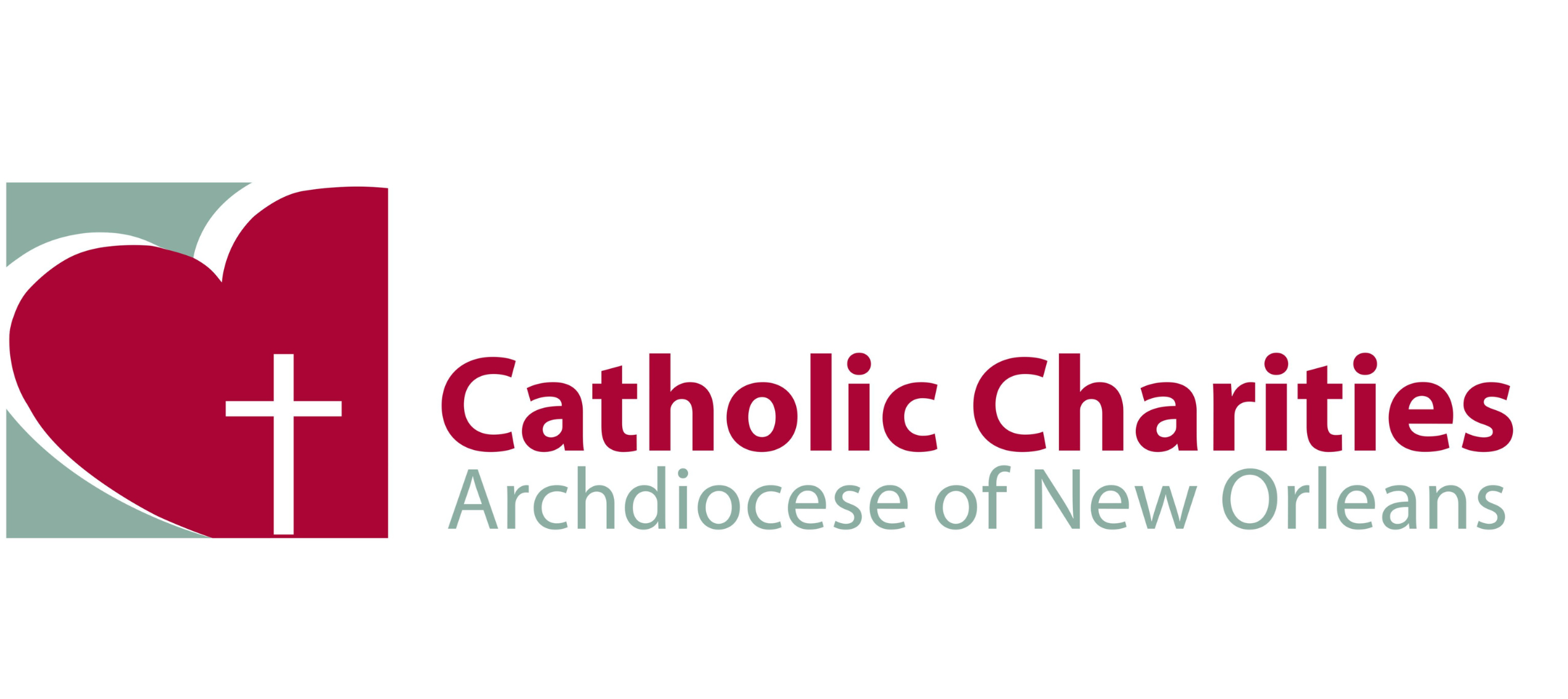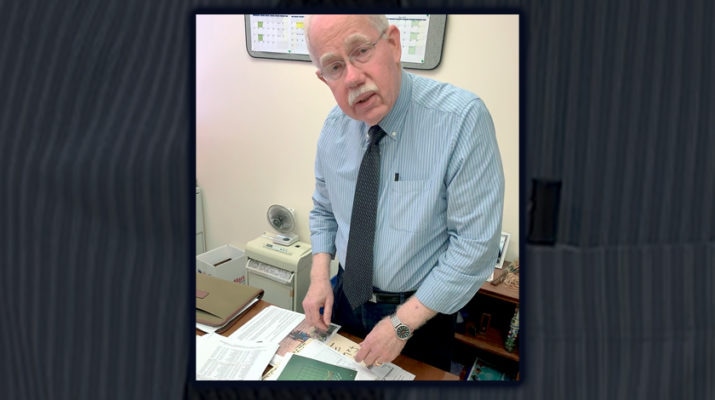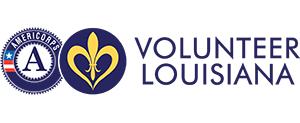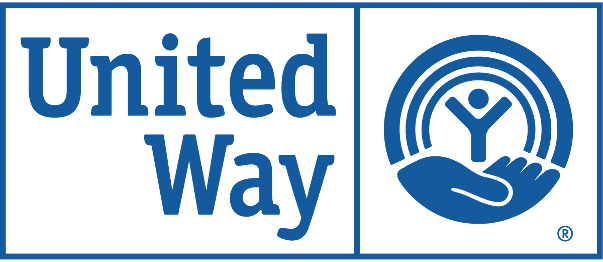March 27, 2019 by Peter Finney, Jr.
It takes about three steps to walk across Orville Duggan’s 135-square-foot office, which reveals a minimalist story about the chief administrative officer of Catholic Charities Archdiocese of New Orleans.
Duggan, 70, is about as unassuming and simple as a man could be having worked for the last 40 years, always sotto voce, serving the poor and the sick.
On one shelf is a small toy he whittled from a single piece of fir: a six-inch cage with a free-rolling ball that his carving knife somehow freed from the wood block.
“I don’t have any expensive hobbies – not that that’s bad,” Duggan says.
He and his wife Jane, married for 46 years, live in a 1,100-square-foot house in Jefferson. They don’t have cable.
“That’s big enough for the two of us,” Duggan said, smiling. “So, I have no overhead. Jane and I adopted a phrase a long time ago: ‘Live simply so others can simply live.’ That’s pretty ingrained.”
His professional life at Catholic Charities has mirrored his personal life.
“It’s hard for people to grasp our myriad of services,” Duggan said. “We have high ethical standards of service. You’re sitting in a standard office. It’s not plush. We don’t have company cars. We don’t have executive privileges or executive benefits. We’ve got old furniture.”
Having been raised by a military father and a mom who taught second-grade near Vinton, Louisiana – six miles from the Texas border – Duggan has had a lifelong passion for books. He tries to read one a month. There was only one Piggly Wiggly in Vinton, so the family shopped for groceries mostly in Texas.
His own life has been one of those mysteriously winding Catholic autobiographies, filled with surprise and amazement, punctuated by his daily walk through Matthew 25, committed to serving those least among us.
Duggan was president of the Baptist Student Union at Northwestern State University in Nachitoches, double-majoring in psychology and sociology, when he met Jane, a member of the first graduating class of Archbishop Chapelle High School, who was studying nursing.
They started dating and Duggan began attending Holy Cross Catholic Church just off campus, where the late Holy Cross Father Jim Fahey befriended the couple.
“I was searching,” Duggan recalled.
Duggan’s pull toward the Catholic Church was not without stress. Some of his friends understood; others did not. “I had some friends who stood by me and said, ‘You need to make your own decisions,’” Duggan said.
Duggan had completed a master’s degree in rehabilitation counseling at the University of Southwestern Louisiana when he and Jane married and moved to New Orleans. As part of his internship, he began working in vocational rehab for the deaf through a state agency. The agency’s office was located in the Catholic Deaf Center at Holy Trinity Catholic Church in the Bywater.
Duggan picked up sign language through classwork and immersion.
“When you are working with deaf people every day, you learn quickly,” Duggan said. “I fell in love with it. Sign language is visual. You’ve got to look at a person and understand facial expressions. It’s not word for word. It’s concept.”
In 1979 – 40 years ago – Father Paul Desrosiers asked him to join the Catholic Deaf Center as an administrator. Part of Duggan’s job was trying to find employment for the deaf.
“There’s a lot stacked against you,” Duggan said. “Many times I would meet young people who had very limited education, because their parents didn’t know what to do. If you are an 18-year-old with minimal reading skills and you can’t hear and you have no voice, you can’t just say, ‘Read the manual.’ It was very rewarding to get people employment.”
Some of the best job placements were federal jobs with the Post Office, the U.S. Army Corps of Engineers, the National Finance Center in New Orleans East and the Naval Support Activity in Algiers. In those days, the Post Office needed workers who could sort mail by typing in zip codes on a noisy machine.
“A deaf person could handle a lot of noise, and it was very good pay,” Duggan said.
In the mid-1980s, in part because of his great knowledge of job placement, Duggan became director of administrative services for Catholic Charities. At the time of Hurricane Katrina, Catholic Charities employed 900 people across an array of programs.
When Katrina hit, hundreds of those staffers were scattered across the country, and Jane volunteered to work side by side with her husband in a trailer near the Catholic Life Center in Baton Rouge to find out where those staffers were and if they were planning to come back.
“We needed help, so Jane made herself a name tag that said ‘VOLUNTEER,’ and she began making calls,” Duggan said. “Everybody had a story, which was real hard to listen to, but she was compassionate. This wasn’t a time just to take ‘name, rank and serial number.’ Over time, when people would call back, they would say, ‘I want to talk to Miss Jane.’”
Through the disaster, Duggan said, Catholic Charities learned how to adjust on the fly.
“You have to take chances,” he said. “You have to have a plan – but plan on doing something different. We can all say, ‘We’re going to set up shop at the corner of Hollywood and Vine the Monday after the storm, but that’s baloney. Your car is going to break down, your wife’s going to get sick, your wife’s going to have a baby, you find out that your house has been blown away.”
After 40 years of service, Duggan is retiring. He and Jane have three adult children and nine grandchildren – with twins on the way. The “plan” is to spend more time visiting their kids and grandkids who live out of town, but Duggan knows to laugh about plans.
“You know, I’ve never not worked,” he said. “I’ve been here for 40 years, and I’ve never had a break in employment – taking four weeks off waiting for a new job to start. I’m sure there are some things that I could migrate to, but I’m not looking for another job.”
Duggan has always liked woodcarving and drawing. For each of his grandchildren’s birthdays, he will ask the child’s parents for some guidance and draw a personalized card with a cartoon: 12-year-old Joe in Philadelphia got a snowman with a hair dryer; 4-year-old Peter got a dinosaur.
Duggan usually puts on the back flap a picture of small house – maybe it is the little house on the Jefferson prairie – with smoke cascading from the chimney. He signs it: “Home Mark Cards.”
“Hallmark might say that’s an infringement problem,” Duggan said.
Among his most cherished times at Catholic Charities have been orientations for new staff, where Duggan gets to tell the agency’s story through his characteristically simple lens.
“I usually say, ‘I’m not here to challenge your faith life or to tell you you have to be Christian or Catholic, but most of us, by this point in life, have heard a little bit about what is called the parables. Jesus didn’t say, “Put the children in the back room.” He said, “Bring to us those who are ill, and feed the hungry.” Do y’all know about the Good Samaritan? That’s why we do what we do.’
“I don’t quote Scripture, but they know it. I keep it third-grade theology. And you know they are not Catholic because they say, ‘Amen!’ Those persons are faith-filled individuals.”






